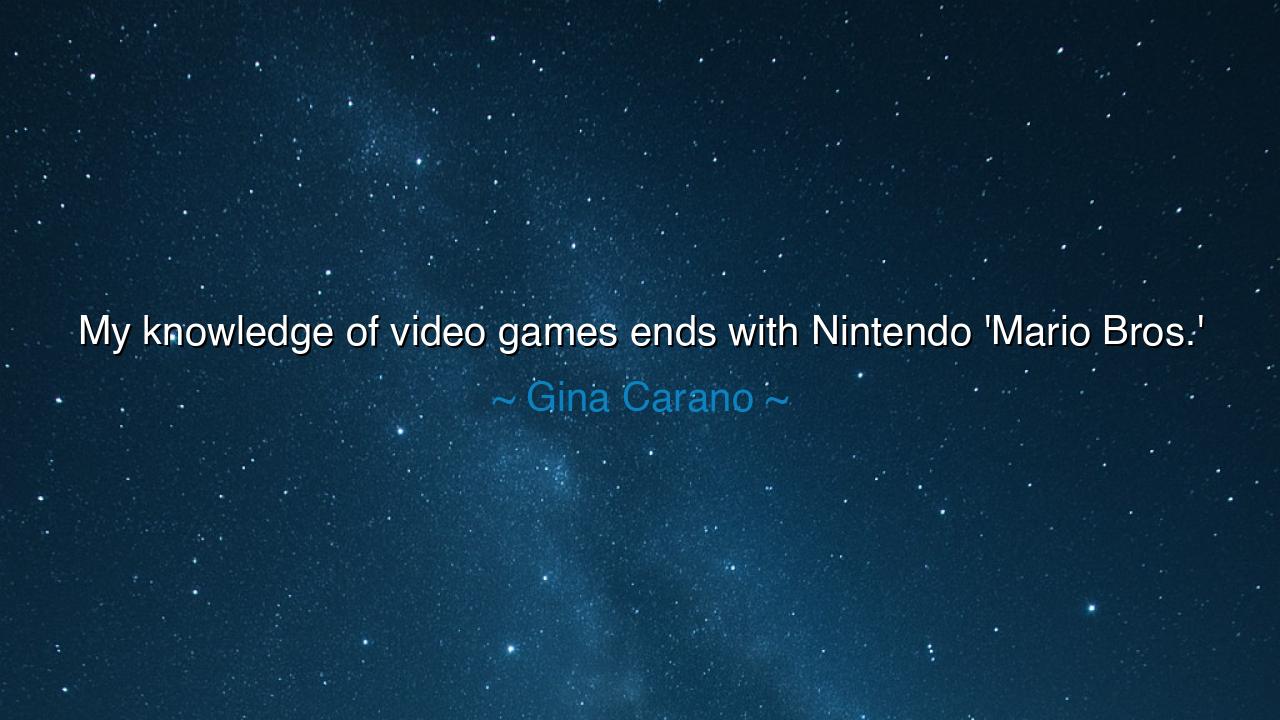
My knowledge of video games ends with Nintendo 'Mario Bros.'






In the words of Gina Carano: “My knowledge of video games ends with Nintendo ‘Mario Bros.’” At first, these words may sound lighthearted, a confession of limited familiarity with a world of digital play. Yet beneath them lies a truth that echoes through the ages: that not every person must walk the ever-advancing path of technology, for there is wisdom, even dignity, in knowing one’s boundaries. To admit the limit of one’s knowledge is itself a form of strength, for it shows humility and clarity, virtues more enduring than novelty.
The ancients often spoke of the measure of wisdom not as the accumulation of facts, but as the recognition of one’s own ignorance. Socrates, the philosopher, declared himself wiser than others not because he knew more, but because he admitted that he did not know. In this same spirit, Carano’s words remind us that knowledge has many forms, and one does not need to master every art of the age in order to live fully. Sometimes, the courage to confess “I do not know” is greater than the pride of pretending mastery.
Consider the tale of Mario Bros., the game she names. It was not merely a pastime; it was a cultural milestone, a symbol of the dawn of a new digital era. Children and adults alike gathered before the glow of the screen, guiding humble plumbers through trials of pipes and castles, leaping over dangers and striving to rescue what was lost. For many, this game was the gateway to a vast universe of electronic adventure. To stop one’s journey there is not to dismiss the future, but to honor the moment when wonder was first discovered.
History provides us with countless examples of those who embraced a portion of the world without feeling the need to possess all of it. Marcus Aurelius, emperor and philosopher, ruled an empire stretching across continents, yet he confessed in his Meditations that even emperors cannot master all knowledge. Instead, he sought to know what mattered most: virtue, justice, duty. So too, Carano’s confession tells us that while others may plunge deeper into the ever-expanding labyrinth of video games, she holds close her memory of Mario Bros., treasuring it as the piece of knowledge that speaks most to her life’s journey.
Her words also invite reflection on the limits of human pursuit. The world forever offers new inventions, new entertainments, new ways of living. To chase them all is to be forever restless, never rooted. But to embrace what one knows, and to dwell deeply in it, is to live with a sense of balance. Just as the gardener who tends a single rose with devotion may taste more beauty than one who chases after endless fields, so too can a soul who knows their limits live with greater peace.
The lesson is clear: do not despise the boundaries of your knowledge, nor feel shame when others know more of the fashions of the age. Instead, embrace humility. Seek wisdom in the areas that truly matter to you, and let others walk their own paths. Value depth over breadth, sincerity over appearance, and do not measure your worth against the shifting tides of technology or trend.
Therefore, O listener, remember this teaching: to know yourself is greater than to know all things. If your knowledge ends with Mario Bros., let it end there with joy, for life is not a contest of accumulation but a journey of authenticity. The treasures of the heart—courage, humility, and truth—outlast every passing invention. Seek those treasures first, and you will walk the path of wisdom, even while others chase endlessly after the new.






AAdministratorAdministrator
Welcome, honored guests. Please leave a comment, we will respond soon